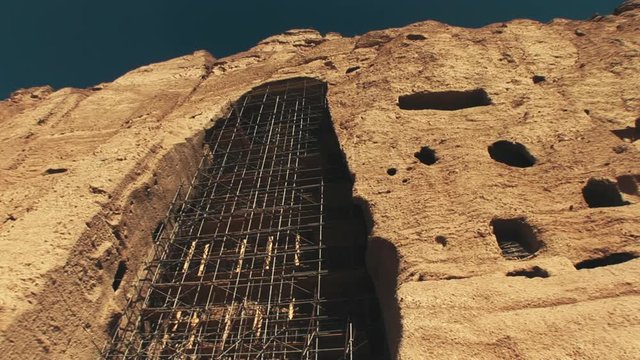Wed 26 Apr 2023:
The United Nations Educational, Scientific and Cultural Organization (UNESCO) has resumed work on preserving heritage sites in Afghanistan’s Bamiyan province.
Through an Italian-funded project, UNESCO has reportedly started preserving Bamiyan’s cultural and archaeological sites that were added to the World Heritage in Danger list in 2003.

ART news reported these sites include wall paintings and religious artifacts from the third to the fifth centuries C.E.
“The Bamiyan Valley is the most monumental expression of Western Buddhism. It was an important pilgrimage centre over many centuries,” UNESCO said, adding, “Due to their symbolic values, the monuments have suffered at different times of their existence, including the deliberate destruction in 2001, which shook the whole world.”

Local men standing near the larger “Salsal” Buddha statue, c. 1940. Source: Wikipedia
Meanwhile, UNESCO has been working on preserving the Minaret of Jam and other sites in Afghanistan, including Kabul, Kandahar, Zabul and Ghazni.
Mawlawi Saifurrahman Mohammadi, the Taliban’s director of ministry for information and culture for Bamiyan, says his government has done everything it can to protect and secure Bamiyan and other heritage sites across the country but stresses it needs international support to do the job.

“We don’t mind if it is Unesco or any other international organisation that wants to come and help preserve our heritage sites—the most important issue for us is that these sites are safeguarded,” Mohammadi says. “Without a doubt, heritage preservation projects will have a positive impact on the social and economic situation of people in Afghanistan and we support them,” he adds.
On 11 March 2001 the Taliban destroyed Bamiyan’s monumental sixth- and seventh-century Buddha statues. Although the group has never publicly expressed regret for its actions, the ministry of information and culture has marked 11 March Cultural Heritage Preservation Day and even held an event this year in Kabul’s National Museum of Afghanistan at which officials stressed the importance of safeguarding all heritage sites, including pre-Islamic ones.
Most foreign investment and projects were halted after the Taliban takeover of the country, due to investors’ fears of unintentionally breaking the sanctions imposed on the country. As a result, Afghanistan’s economy has crumbled and it has been isolated from much of the outside world, especially from the West.
Although Unesco and private foundations have continued with some heritage projects in the country, Italy’s decision to restart the Bamiyan project is thought to make it the first country to approve funding in the field of conservation in Afghanistan.
SOURCE: INDEPENDENT PRESS AND NEWS AGENCIES
______________________________________________________________
FOLLOW INDEPENDENT PRESS:
TWITTER (CLICK HERE)
https://twitter.com/IpIndependent
FACEBOOK (CLICK HERE)
https://web.facebook.com/ipindependent
Think your friends would be interested? Share this story!





